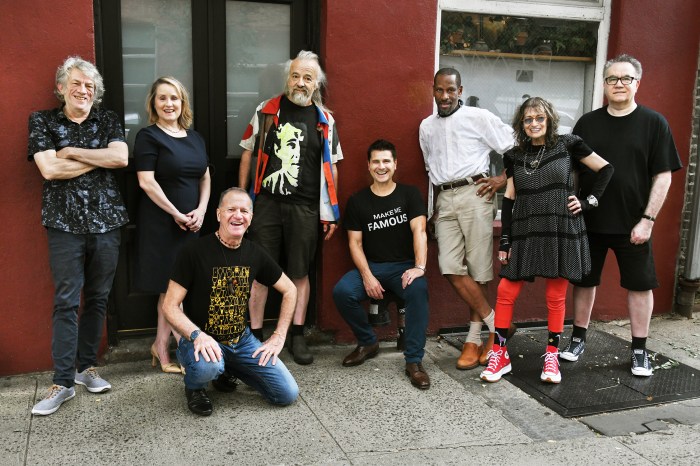By Aline Reynolds
Soho residents are fighting tooth and nail to prevent a business improvement district from being created in the area and to keep their neighborhood’s zoning laws.
More than 100 area residents gathered in the Puffin Room, at 435 Broome St., on Feb. 28 to voice their reservations about the business improvement district, or BID. An anti-BID protest is scheduled for April 2 in front of Councilmember Margaret Chin’s Downtown district office, at 165 Park Row, when demonstrators will hand-deliver letters to Chin’s office contesting her possible support of the BID.
The Feb. 28 discussion, mediated by Puffin Gallery owner and Soho resident Carl Rosenstein, quickly evolved into a series of individual tirades against the proposal. The BID, according to its opponents, would give commercial property owners and ground-floor retail stores authority over residents in neighborhood-wide decisions.
“We each, in our own way, contributed to the creation of Soho as a laissez-faire district,” said Rosenstein. “The issue of being obligated to be taxed by a private entity is undemocratic.”
The setup, he and others fear, would be inequitable, since people living in co-ops — mainly longtime residents — might not have as much say as condo dwellers in the allocation of funds to better the neighborhood.
“What they do is, they take over a lot of the power that really should go to the people that actually live and vote in the districts,” said Broome St. resident Lora Tenenbaum, a former Community Board 2 member. “It really is, to a great extent, taxation without representation,” she added. “It’s going back to the days when the landowners got to vote, and the workers didn’t.”
The BID organizers, however, are refuting these allegations.
Barbara Cohen, a senior associate at Robert B. Pauls consultancy, said of the critics’ concerns, “They’re making the grand jump to say” how much representation each property will have in terms of voting on BID-related matters — before the BID is even formed and its bylaws are created. Cohen — whose firm is assisting in the BID’s formation — pointed out that the BID’s steering committee is made up of co-op residents as well as property owners.
The opponents also argue that the need to keep Broadway litter-free, a primary function of the proposed BID, does not justify establishing a new group with an operating budget of $700,000.
“Just because ACE says it can’t do it anymore doesn’t mean this is the solution,” said Tenenbaum. “It’s killing a gnat with a sledgehammer.” She was referring to the Association of Community Employment, which, up until now, has been providing supplementary sanitation services in Soho.
They’re also against the potential rise in tourism they fear the BID could bring.
“To attract more people — it’s just an insane idea,” said Rosenstein. The neighborhood, he said, has already turned into one big shopping mall. “It’s kind of insulting to say, ‘We’re going to officially turn it into a mall.’ ”
Business interests are what’s driving the BID, and as a result, residents’ needs will be overlooked, according to John Rockville, a Broadway resident.
“For me,” he said, “the problem is the sheer density of street traffic. It’d get worse, ’cause they’re trying to maximize business.”
Councilmember Chin was invited to the Feb. 28 meeting, but couldn’t attend due to a scheduling conflict, according to her communications director, Kelly Magee.
The councilmember is scheduling a meeting with Soho residents — including those living outside the BID’s boundaries — and BID organizers for sometime before March 17, the date of the next BID steering committee meeting.
“We still think it would be good to get everyone in a room together to discuss the BID, and are working to make that happen,” said Magee.
In her talking point published in this newspaper’s Feb. 24 issue, the councilmember said she would not support the BID unless she sees “substantial support” from residents in the proposed district area. “To date,” she said in her talking point, “that is not the case. To date, I have not come out in support of the Broadway BID.”
When the BID goes before the City Council in the coming months, she wrote, “I will base my decision on input from my constituents,” hoping in the meantime to “find compromise and reconcile disparate perspectives.”
The councilmember was not available for follow-up comment.
Another reason Chin and others have not endorsed the BID is because residents in six mixed-use co-op buildings (within the BID boundaries) who own the buildings’ first-floor commercial properties, will have to pay an average annual fee of $52 per apartment unit. (Residents in all other co-op buildings will purportedly be reimbursed for any BID assessments, and all other residents in the BID will only pay a symbolic $1 per year.)
These six co-ops, which financially benefit from the commercial businesses in their buildings, “are treated no differently than a mixed-use rental property,” according to the BID steering committee. “The resident shareholder, in this case, is truly the embodiment of ‘mixed-use,’ as this resident is also a commercial property owner, as they own shares of a business co-operation that owns commercial property,” according to the steering committee.
Though these co-op residents could possibly become exempt from the annual BID fee, it’s a complicated process that requires a “full investigation” by the BID steering committee and the co-ops.
“If the BID was established, the BID could certainly assist in looking into this possibility with each co-op property,” said Cohen.
Stakeholders are also lobbying for a modification of Soho’s manufacturing zoning restrictions to usher in nonartist residents, as well as artists, to the increasingly trendy neighborhood. It’s the 40th anniversary of the Soho zoning’s artist-in-residence regulation, which only permits certified artists to legally live in Soho lofts. The city has stepped up enforcement of the rule in recent years, which has weakened sales in the area, according to several sources.
Margaret Baisley, a Soho-based real estate attorney who opposes the artist-certification requirement, plans to set up an organization in support of a zoning change, which she and other advocates are discussing with city officials. The zoning they’re advocating would replace joint-live-work quarters for artists with ordinary apartment dwellings available to any type of resident.
Longtime artist tenants, Baisley said, would ideally be grandfathered into the new zoning.
“I’ve never seen so much interest in this question in the last 20 years — it’s affecting sales, rentals, as well as alterations of individual units,” she said of the impediment posed by artist certification. Buildings eligible for temporary certificates of occupancy, Baisley noted, are now required to prove artist certification of all of their units.
“Governments need to recognize that most people in Soho and Noho are not artists, and it doesn’t help anyone to enforce the statute,” she stressed.
Baisley will meet with representatives from managing companies and co-op boards in the coming weeks to determine a preliminary budget for the fledgling organization, whose rezoning efforts are projected to cost around $1 million.
“We’re going to start raising funds to establish a Web site, to gather additional supporters of the zoning change, and to get our message heard,” she said.
Eventually, the group will formulate an environmental impact statement, a prerequisite for such a community-driven zoning change.
Many stakeholders maintain, though, that the zoning modification should be handled by the city rather than the community. Co-op buildings, Baisley explained, are hampered these days by increases in real estate taxes and rising fuel and insurance charges, leaving them with scant funds to contribute to the zoning project.
“We believe it’s unfair to require denizens to pay for a rezoning that should be given to them as an ordinary matter of law,” Baisley said, pointing to the city’s rezoning of Tribeca in the 1990’s, which did not inflict fees on area residents.
“Why must we be penalized and charged for a long-overdue benefit that others in the city receive without payment?” she asked.
Meg Siegel, a real estate broker in Soho, said the artist-certification requirement has recently slowed sales, since potential buyers often question the language of the purchase agreement.
“People have sold and bought and they can’t resell, because there’s this supplement on the books that’s antiquated,” she said, calling it a discriminatory practice. “It makes me feel uncomfortable living in my own neighborhood that I love and respect.”
Michael Slattery, senior vice president of the Real Estate Board of New York, which represents brokerage firms in Soho, affirmed that brokers have recently expressed concern about the rule’s increased enforcement.
“We’ve been told that sales activity has slowed down,” he said. “There are very few certified artists eligible as purchasers, so you just don’t have a pool of prospective buyers.”
The drop in demand, which has led to a decline in the lofts’ asking prices, might be particularly detrimental to elderly Soho residents looking to cash in on their lofts.
“They’re getting old, and they can’t live in a walk-up anymore,” said Soho resident Debra Feinn. “If they can’t sell their lofts, they’re really in trouble.”
“That’s their nest egg,” chimed in Rockville. “If the nest egg is destroyed, they’re screwed.”
But others at the community meeting argued for the preservation of current zoning, including the artist-certification law.
Sean Sweeney, director of the Soho Alliance, worried that eliminating the artist-certification rule would attract more high-maintenance corporate types into a neighborhood full of old-time artists. A new nonartist tenant in Sweeney’s building on Greene St., for example, insisted on significant renovations to the building’s lobby, costing each unit $12,000.
Sweeney also argued that the rule protects some artist tenants who face eviction by their landlords. Since many of the loft owners lack artist’s certification, he explained, they are typically denied in their efforts to seize their properties from their tenants.
However, Baisley assured, “We’re not interested in throwing artists out on their ear. We want everyone to live in peace in their own homes, as they should.”
The debate, Sweeney countered, is a tempest in a teapot.
“This is an urban myth that people are having a hard time” due to the artist-certification rule, he said. “You can’t find anyone who is severely harmed by it.”
Sweeney said he visited the Soho branch of HSBC, where a bank official denied claims by Baisley and others that banks are refusing to give mortgages to Soho residents that lack artist certification.
“They said they have no idea what artist’s certification is,” he said.





































